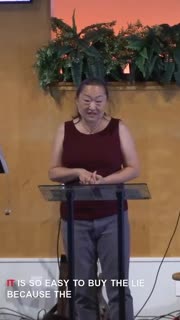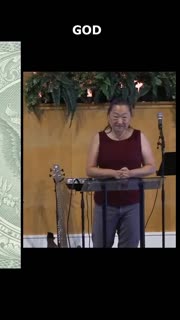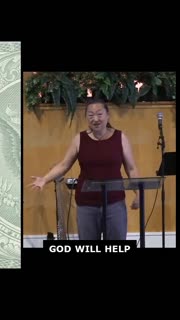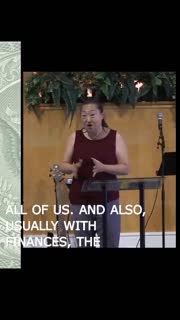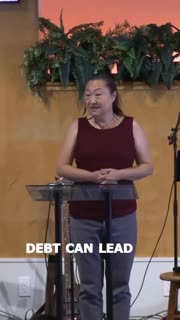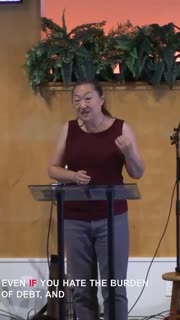Navigating Debt: Wisdom, Integrity, and Community Support
Devotional
Sermon Summary
Bible Study Guide
Sermon Clips
### Quotes for Outreach
1. "Debt in our culture and in this world is so easy to get into. I want to give you an example. A story from my own life. When my husband and I got married, we vacationed in Hawaii. And my husband's father, my father-in-law, gave our honeymoon, the payment of our honeymoon, as a gift. So we went to Maui and then we went to Kauai. And the place in Kauai was just a beautiful, amazing place." [46:51] (32 seconds)
2. "It is so easy to buy the lie because the lies are swirling all around us all the time. Am I right? All around us all the time. You got to do this. You got a vacation here. You got to look like this. You got to XX and Y. You got to do all these things. You open up a magazine, turn on your computer, and you're inundated by what the good life, loving your children, having a centered soul, what those things are." [54:11] (38 seconds)
3. "God loves you. And God loves you the same, whether you have debt or you have no debt. I just want you to sink that in. God loves you the same, whether you have debt in your life or not. Having debt won't reduce God's love for you, and being debt free won't increase it. God just loves you. And there's nothing that you can do with your financial situation that will change that." [01:18:55] (34 seconds)
4. "God will help you. The reason why we're talking about this is because there's much help from the hand of God about debt, and our finances in general. And some of us who have had debt experience fear, or denial, or shame, or just caught in a web of lack of wisdom. Part of how God will give you wisdom is to minister to those emotions and those feelings of trappedness." [01:19:26] (32 seconds)
5. "All of us. And also, usually with finances, the enemy and the world says you're alone. In fact, you're so alone, you should be hidden. You should be ashamed, and you should not tell anyone about your financial situation. But God says, you are not alone. You are called to live in community, and you can trust me and others. You see the difference? That is a really important difference." [01:19:56] (30 seconds)
### Quotes for Members
1. "The Bible does not forgive, forbid debt, but it does not speak positively of it. It acknowledges that debt is a part of life at times many times, but it has several warnings that we really need to pay attention to. So I'm going to give you three warnings that come from the Scripture. Warning number one is we ought to be cautious about going into debt." [01:03:57] (27 seconds)
2. "Debt can lead to stress and even medical problems. Debt can lead to difficulty for marriages. And this one I related to so much. Debt puts you in a pattern of spending more than you actually can afford. Here's how that works. When you can pay something and not necessarily pay for it in the moment, you are in the practice and the experience of paying for something but not having to experience the pain of paying for it." [01:11:55] (40 seconds)
3. "Even if you hate the burden of debt, and again, I've said, we all enter into debt in many different ways. Some of us, out of foolishness, some of us, just because that's how our society works, but however you get into debt, you must still pay it. And that's from God's heart. You must pay your debt. Everyone, in everyone's mind, like, wouldn't it be amazing if you could have debt, if you could have a mortgage or credit card debt, and then just not pay it and die." [01:15:07] (39 seconds)
4. "I call upon us as a church, whether you have debt or not, whether you have burdensome debt or not, to live in community, to care, and to lean into trusting God and helping each other. I realize that this, well, every sermon should minister to your mind and your heart, and to me, this sermon has a little bit more mind. But I'm gonna invite us into one minute of silence and ask God to speak to both your mind and your heart." [01:23:06] (43 seconds)
5. "I had a friend who was in a very large amount of credit card debt. And it was gnawing at her soul. She was in her 20s, and she had a huge amount of credit card debt. And so one of the things we did is she and another friend and I got together with her once a month, and we gently, but with wisdom from God and prayer, just met with her and listened to her, prayed for her, and kept her accountable to the things she decided to do to respond and get out of debt." [01:20:28] (37 seconds)
Ask a question about this sermon
1. "Debt in our culture and in this world is so easy to get into. I want to give you an example. A story from my own life. When my husband and I got married, we vacationed in Hawaii. And my husband's father, my father-in-law, gave our honeymoon, the payment of our honeymoon, as a gift. So we went to Maui and then we went to Kauai. And the place in Kauai was just a beautiful, amazing place." [46:51] (32 seconds)
2. "It is so easy to buy the lie because the lies are swirling all around us all the time. Am I right? All around us all the time. You got to do this. You got a vacation here. You got to look like this. You got to XX and Y. You got to do all these things. You open up a magazine, turn on your computer, and you're inundated by what the good life, loving your children, having a centered soul, what those things are." [54:11] (38 seconds)
3. "God loves you. And God loves you the same, whether you have debt or you have no debt. I just want you to sink that in. God loves you the same, whether you have debt in your life or not. Having debt won't reduce God's love for you, and being debt free won't increase it. God just loves you. And there's nothing that you can do with your financial situation that will change that." [01:18:55] (34 seconds)
4. "God will help you. The reason why we're talking about this is because there's much help from the hand of God about debt, and our finances in general. And some of us who have had debt experience fear, or denial, or shame, or just caught in a web of lack of wisdom. Part of how God will give you wisdom is to minister to those emotions and those feelings of trappedness." [01:19:26] (32 seconds)
5. "All of us. And also, usually with finances, the enemy and the world says you're alone. In fact, you're so alone, you should be hidden. You should be ashamed, and you should not tell anyone about your financial situation. But God says, you are not alone. You are called to live in community, and you can trust me and others. You see the difference? That is a really important difference." [01:19:56] (30 seconds)
### Quotes for Members
1. "The Bible does not forgive, forbid debt, but it does not speak positively of it. It acknowledges that debt is a part of life at times many times, but it has several warnings that we really need to pay attention to. So I'm going to give you three warnings that come from the Scripture. Warning number one is we ought to be cautious about going into debt." [01:03:57] (27 seconds)
2. "Debt can lead to stress and even medical problems. Debt can lead to difficulty for marriages. And this one I related to so much. Debt puts you in a pattern of spending more than you actually can afford. Here's how that works. When you can pay something and not necessarily pay for it in the moment, you are in the practice and the experience of paying for something but not having to experience the pain of paying for it." [01:11:55] (40 seconds)
3. "Even if you hate the burden of debt, and again, I've said, we all enter into debt in many different ways. Some of us, out of foolishness, some of us, just because that's how our society works, but however you get into debt, you must still pay it. And that's from God's heart. You must pay your debt. Everyone, in everyone's mind, like, wouldn't it be amazing if you could have debt, if you could have a mortgage or credit card debt, and then just not pay it and die." [01:15:07] (39 seconds)
4. "I call upon us as a church, whether you have debt or not, whether you have burdensome debt or not, to live in community, to care, and to lean into trusting God and helping each other. I realize that this, well, every sermon should minister to your mind and your heart, and to me, this sermon has a little bit more mind. But I'm gonna invite us into one minute of silence and ask God to speak to both your mind and your heart." [01:23:06] (43 seconds)
5. "I had a friend who was in a very large amount of credit card debt. And it was gnawing at her soul. She was in her 20s, and she had a huge amount of credit card debt. And so one of the things we did is she and another friend and I got together with her once a month, and we gently, but with wisdom from God and prayer, just met with her and listened to her, prayed for her, and kept her accountable to the things she decided to do to respond and get out of debt." [01:20:28] (37 seconds)

